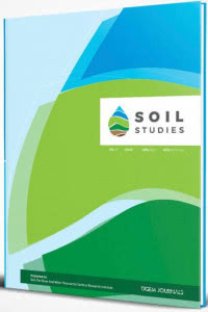Organik Atık ve Sentetik Düzenleyici Uygulamalarının Kıvam Limitleri Üzerine Etkisi
Bu araştırma, kumlu tın ve killi tın tekstüre sahip iki toprakta buğday samanı (WS), fındık zurufu (HH), hümik asit (HA) ve poliakrilamid (PAM) uygulamalarının kıvam limitleri (likit limit (LL), plastik limit (PL), plastiklik indeksi (PI)) üzerine etkilerini belirlemek üzere yürütülmüştür. Çalışmada kullanılan toprak örnekleri, Samsun ili Bafra ilçesinde tarla tarımı yapılan iki farklı araziden (0-20 cm) alınmıştır. Bölünmüş parseller deneme deseninde yürütülen çalışmada buğday samanı (0, %2, %4), fındık zurufu (0, %2, %4), hümik asit (0, 200 ve 1000 ppm) ve PAM (0, 30 ve 90 ppm) topraklara üç tekerrürlü olarak uygulanmıştır. Sonuç olarak, likit limit, plastik limit ve plastiklik indeksi değerlerinin her iki toprak tekstüründe de organik ve sentetik düzenleyici uygulaması ile arttığı, etkininin WS>HH>HA>PAM şeklinde gerçekleştiği tespit edilmiştir. Her iki toprak tekstürün de PAM hariç en yüksek doz uygulamasının daha etkili olduğu görülmüştür.
Anahtar Kelimeler:
fındık zürufu, hümik asit, likit limit, plastik limit
The Effect of Organic Waste and Synthetic Conditioner Applications on Consistency Limits
This study was carried out to determine the effects of wheat straw (WS), hazelnut husk (HH), humic acid (HA) and polyacrylamide (PAM) treatments on consistency limits (liquid limit (LL), plastic limit (PL), plasticity index (PI)) in two soils with sandy loam and clayey loam in texture. Soil samples used in the study were taken from two different areas of land (0-20 cm) from Samsun province's Bafra district. WS (0, 2%, 4%), HH (0, 2%, 4%), HA (0, 200 and 1000 ppm) and PAM (0, 30 and 90 ppm) were used in this study that was conducted in a split plots experimental design with three replications. According to the results; it was determined that the liquid limit, plastic limit and plasticity index values increased with the application of organic and synthetic conditioners in both soil texture, and the effect was realized as WS>HH>HA>PAM. It was observed that the highest dose application was the more effective in both soil texture, except for PAM.
Keywords:
Hazelnut husk, humic acid, liquid limit, plastic limit,
___
- Aksakal EL, Angin I, Oztas T (2013). Effects of diatomite on soil consistency limits and soil compactibility. Catena, 101, 157–163. doi: 10.1016/j.catena.2012.09.001.
- Bayraklı F (1987). Toprak ve Bitki Analizleri. Ondokuz Mayıs Üniversitesi Yayınları, Yayın No: 17, Samsun.
- Canbolat MY, Öztaş T (1997). Toprağın kıvam limitleri üzerine etki eden bazı faktörler ve kıvam limitlerinin tarımsal yönden değerlendirilmesi. Atatürk Üniversitesi Ziraat Fakültesi Dergisi. 28 (1): 120-129.
- Casagrande A (1932). Research on the Atterberg limits of soils. Public roads, 13(8), 121-136.
- Demir S, Kılıç K, Aydın M (2012). Farklı Kullanım Altındaki Toprakların Kıvam Limitleriyle Bazı Toprak Özellikleri Arasındaki İlişki.
- Demiralay İ, Güresinli YZ (1979). Erzurum Ovası topraklarının kıvam limitleri ve sıkışabilirliği üzerinde bir araştırma. Atatürk Ün. Zir. Fak., Der. 10: 77-93.
- Deng Y, Cai C, Xia D, Ding S, Chen J, Wang T (2017). Soil Atterberg limits of different weathering profiles of the collapsing gullies in the hilly granitic region of southern China. Solid Earth. 8:499–513. doi: 10.5194/se-8-499-2017.
- Dexter AR, Bird NRA (2001). Methods for predicting the optimum and the range of soil water contents for tillage based on the water retention curve. Soil and Tillage Research, 57(4), 203-212.
- Farrar DM, Coleman JD (1967). The correlation of surface area with other properties of nineteen British clay soils. Journal of Soil Science, 18(1), 118-124.
- Gee GW, Bauder JW, Klute A (1986). Methods of Soil Analysis, Part 1. Physical and Mineralogical Methods. Soil Science Society of America, American Society of Agronomy.
- Gülser C, Candemir F (2006). Ondokuz Mayıs Üniversitesi Kurupelit Kampüs Topraklarının Bazı Mekaniksel Özellikleri ve İşlenebilirlikleri. Anadolu Tarım Bilimleri Dergisi, 21(2), 213-217.
- Kacar B (1994). Bitki ve Toprağın Kimyasal Analizleri, III. Toprak Analizleri. Ankara Üniversitesi Ziraat Fak. Eğitim Araş. Ve Gel.Vakfı Yay., No:3 Ankara.
- Kara Z, Yakupoğlu T, Sesveren S, Solak S, Saltali K (2018). Applied to agriculture soil gyttja: effect on the Atterberg limits and some physical parameters.
- Minitab Inc. (2013). Minitab 17.1 (Computer Software). State College, PA: Minitab, Inc.
- Mueller L, Schindler U, Fausey NR, Lal R (2003). Comparison of methods for estimating maximum soil water content for optimum workability. Soil and Tillage Research, 72(1), 9-20.
- Nelson DW, Sommers L (1983). Total carbon, organic carbon and organic matter. Methods of soil analysis: Part 2 chemical and microbiological properties, 9, 539-579.
- Odell RT, Thornburn TH, McKenzie LJ (1960). Relationships of Atterberg limits to some other properties of Illinois soils. Soil Science Society of America Journal, 24(4), 297-300.
- Qu J, Li B, Wei T, Li C, Liu B (2014). Effects of rice-husk ash on soil consistency and compactibility, Catena. B.V., 122, 54–60. doi: 10.1016/j.catena.2014.05.016.
- Rezaee L, Moosavi AA, Davatgar N, Sepaskhah AR (2019). Shrinkage-swelling characteristics and plasticity indices of paddy soils: spatial variability and their influential parameters. Archives of Agronomy and Soil Science, 1-21.
- Rowell DL (1996). Soil Science: Methods and Applications. Wesley Longman Ltd, Harlow.
- Sowers GF (1965). Consistency. Methods of Soil Analysis, Part 1. Physical and Mineralogical Properties. Including Statistics of Measurement and Sampling, 9, 391-399.
- Spagnoli G, Sridharan A, Oreste P, Bellato D, Di Matteo L (2018). Statistical variability of the correlation plasticity index versus liquid limit for smectite and kaolinite Applied. Clay Science, 156, 152–159. https://doi.org/10.1016/j.clay.2018.02.001
- Stanchi S, D'Amico M, Zanini E, Freppaz M (2015). Liquid and plastic limits of mountain soils as a function of the soil and horizon type. Catena, 135, 114–121. doi: 10.1016/j.catena.2015.07.021.
- Yakupoğlu T, Özdemir N (2006). Erozyona Uğramış Topraklarda Organik Atık Uygulamalarının Bazı Mekaniksel Özelliklere Etkisi. Anadolu Tarım Bilimleri Dergisi, 21(2), 173-178.
- ISSN: 2146-7072
- Yayın Aralığı: Yılda 2 Sayı
- Yayıncı: Toprak Gübre ve Su Kaynakları Merkez Araştırma Enstitüsü
Sayıdaki Diğer Makaleler
Cafer Hakan YILMAZ, Halil AYTOP, Muhammet Raşit SÜNBÜL
Üç Besinli ve Mikrobesinli Gübrelerin Damla Sulama Sistemine Uygunluğu Üzerinde Çalışmalar
Organik Atık ve Sentetik Düzenleyici Uygulamalarının Kıvam Limitleri Üzerine Etkisi
Zerrin CİVELEK, Nutullah ÖZDEMİR
Kil Bünyeli Bir Arazide Toprak Strüktürü ve Nem Sabitlerinin Tütün Atığı Uygulamasıyla Değişimi
